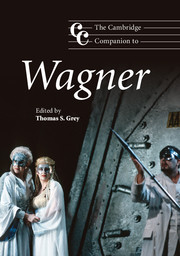Crossref Citations
This Book has been
cited by the following publications. This list is generated based on data provided by Crossref.
CHRISSOCHOIDIS, ILIAS
and
HUCK, STEFFEN
2010.
Elsa's reason: On beliefs and motives in Wagner'sLohengrin.
Cambridge Opera Journal,
Vol. 22,
Issue. 1,
p.
65.
Till, Nicholas
2012.
The Cambridge Companion to Opera Studies.
Lawson, Colin
and
Stowell, Robin
2012.
The Cambridge History of Musical Performance.
Zeiss, Laurel E.
2012.
The Cambridge Companion to Opera Studies.
p.
179.
Kursell, Julia
2015.
A Third Note: Helmholtz, Palestrina, and the Early History of Musicology.
Isis,
Vol. 106,
Issue. 2,
p.
353.
Fry, Katherine
2015.
Conceptualising Wagner.
Cambridge Opera Journal,
Vol. 27,
Issue. 3,
p.
301.
Birx, H. James
and
Milićević, Branko
2016.
Wagner & Nietzsche: The Concept of Evolution.
Anthropologia integra,
Vol. 7,
Issue. 2,
p.
7.
Menger, Pierre-Michel
2018.
Richard Wagner et la portée de son antisémitisme (note critique).
Annales. Histoire, Sciences Sociales,
Vol. 73,
Issue. 3,
p.
669.
Collins, Sarah
2019.
Music and Victorian Liberalism.
Berry, Mark
and
Vazsonyi, Nicholas
2020.
The Cambridge Companion to Wagner's Der Ring des Nibelungen.
Hui, Alexandra
2021.
Interpreting Mach.
p.
10.
Revermann, Martin
2021.
Brecht and Tragedy.



